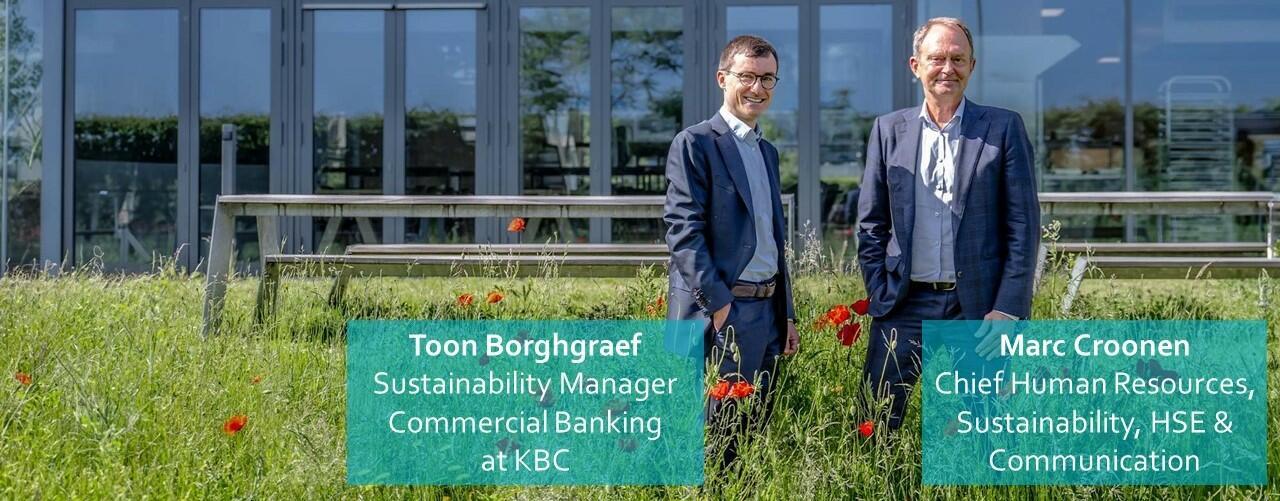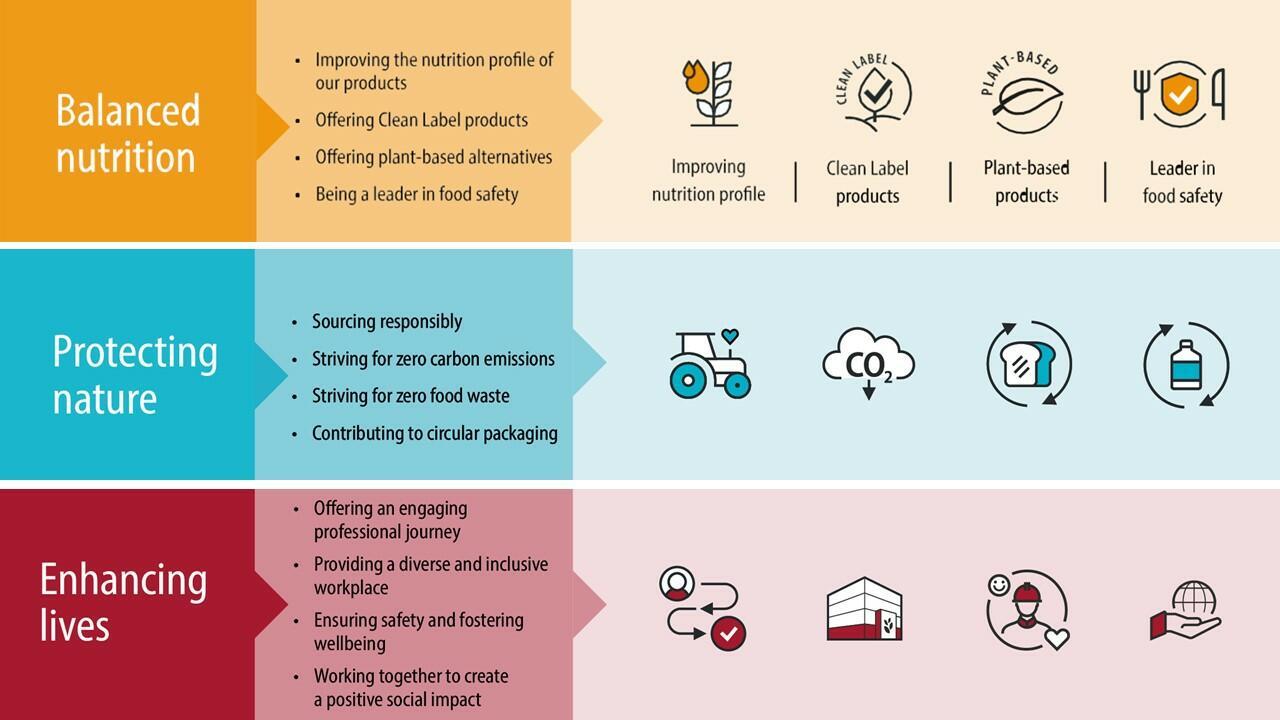What are the CO2 emissions of the entire chain? What about the pay gap between men and women in your company? How many workplace accidents did you record last year?
Soon every major European company will have to communicate about sustainability related topics on a yearly basis. Last weekend, the Belgian newspaper De Tijd published a sustainability talk with KBC bank and food group Vandemoortele as our Chief Human Resources, Sustainability, HSE & Communication Marc Croonen was asked to share some tips.
Scroll down to read the article, translated from Dutch to English.

Soon, 50,000 European companies will have to report on their impact on people and the environment. 'The Corporate Sustainability Reporting Directive or CSRD is a reporting obligation,' says Toon Borghgraef, sustainability manager commercial banking at KBC. The European directive, is part of the ambitious European Green Deal. The objective? 'To ensure that European companies attach as much importance to their sustainability reporting as to their financial reporting.'
Get inspired
So what does this CSRD mean in practice? Basically, it is an extension of the existing legislation for listed companies. 'These organisations are already obliged to communicate about their efforts around sustainability. But this directive goes a lot further,' Borghgraef explains. 'The reporting will be more standardised. Companies will not only have to collect data, but also have it audited annually, just like their financial figures.' Equally important: the CSRD affects a much larger group of companies. Implementation is happening in several waves. Large listed companies already have to prepare their annual reports for 2024 in the new way, while other large companies until 2025.
Borghgraef: 'Specifically, it concerns companies that exceed two of these limits: more than 250 employees, more than 40 million euro turnover, and
more than 20 million euro balance sheet total. In practice, this includes about 50,000 European companies.' Indirectly, smaller companies will also feel the impact. 'Because large companies will set high expectations for their suppliers because of the CSRD, and these are also often SMEs, of which there are many in Flanders.'

In other words, the impact of the new law cannot be underestimated. How can companies prepare? The lengthy legal texts are intimidating as a starting point, but fortunately financial partners and experts offer guidance. 'As a listed company, we have long been obliged to report on our sustainability efforts. We use that experience to guide our clients,' says Borghgraef. In addition to one-to-one advice from experts, KBC offers its client-also concrete tools to collect data, such as a free simplified CO2 calculator, a be- long indicator in CSRD reporting.
Another important tip: dare to look over the hedge. 'Many companies are at the beginning of their journey, but some already have comprehensive endurance reporting. They offer a wealth of inspiration. So already take a look at the sustainability report of your customer, supplier or competitor. KBC's comprehensive sustainability report is also a reference.'
'We also put our clients in touch with partners who can guide them in a sustainability journey. Once companies have a credible sustainability strategy, linked to objectives, we can integrate it into their financing. In this way, we support frontrunners in the sustainability transition,' says Borghgraef.
Marc croonen: 'Since 2019, SUstainability has become a fundamental pillar of our strategy. A conscious choice by the Vandemoortele family and management.'
High transparency
One of the forerunners around sustainability reporting in our country is food group Vandemoortele. Last year, the Institute of Company Auditors rewarded the company with the Best Belgian Sustainability Report award. The jury not only praised the clear language and scientific substruction, but also the high level of transparency. Because Vandemoortele not only puts feathers in its cap, but also communicates about goals not achieved. And a striking best practice: the food group succeeded in integrating its sustainability rapport with its financial results.
'Of course we are proud of that award. But that integrated report didn't come overnight,' says Marc Croonen, chief human resources, sustainability & communications. 'It was a growth process.' Croonen pulls the integrated report, together with the CFO (for the financial part) and the chief legal (for governance & compliance). 'We have been working on sustainability as a company for some time, but since 2019 it has become a fundamental pillar of our strategy.' A conscious choice by the Vandemoortele family and management. 'We want to fulfil our responsibility as a business. Moreover, it is simply the best way forward from a business point of view. The Green Deal, the increasing expectations of consumers and supermarkets, but also for our associates: we are moving towards a world where sustainable business is part of on-taking.'
Reporting is only one aspect of Vandemoortele's sustainability policy, Croonen emphasises. 'Those figures are the deliberate choice to communicate transparently about the achievement of targets, but of course it is also about our sustainability ambitions.' The food company commits itself to three themes: balanced nutrition, protecting nature and enhancing life.

'To these three themes, we linked four major intentions: each time, underpinned by numerous initiatives', says Croonen. Balanced nutrition includes, for example, the intention to reduce the sugar and salt content of our products, protecting nature is about reducing CO2, responsible palm oil, etc.'.
Vandemoortele appoints a project leader in the company for each of the twelve objectives. 'They work on the goals with a network of team members. Over the course of the year, we monitor progress together and report twice externally in a transparent manner.'
Start with a materiality analysis
'Everything starts with a good materiality analysis,' says Croonen. 'Determine which themes are relevant to your company and then incorporate them into the business strategy.' Energy consumption, packaging, inclusiveness, safety: what do associates, suppliers, NGOs and customers care about? What do they want us to address? 'The CSRD legislation is quite complex. If you just walk into that forest, you get lost. A materiality analysis like this provides a compass. It is just like in your personal life: whether you make the choice to eat less meat, isolate your house or sort better - you make conscious choices according to what is important to you and your environment .'
By embedding sustainability in the business strategy, you create a broad commitment. 'Moreover, it leads to business opportunities,' Croonen says convinced. 'Take, for example, our intention to improve the nutritional score of our products. By doing this, we managed to make a margarine to develop the best nutritional score on the market. We then put these in fully recyclable packaging. Supermarkets are eager to take on such a product. It offers competitive advantages.'
Marc Croonen: 'We are asked to think about risks of increasing drought in the regions where we get our grains: these are valuable long-term insights.'
'Such an approach does take time,' warns Borghgraef. 'Therefore, don't wait until 2025. That way you avoid the legislation becoming a compliance problem, and it will just create opportunities.' Croonen confirms. 'By embedding sustainability now, you will develop a culture internally and present a well-founded story to the outside world. Legislation also provides the right tools for this. Take the dual materiality analysis, for example. The CSRD requires companies to think not only about their environmental and social impact, but also about the impact of environmental and social topics on their own operations. An example of the latter: we are asked to think about risks of increasing drought in the regions where we get our grains: these are valuable long-term insights.'
KBC is also reaping the benefits of its sustainability strategy. Toon Borghgraef: 'First of all, we tak responsibility ourselves, for instance by minimising our own footprint. We also want to actively help our customers in their transition. Customers who are working on sustainability are better prepared for the future. As a financial partner, that also benefits us.'
This article was published in De Tijd Connect on Saturday June 24th 2023.
